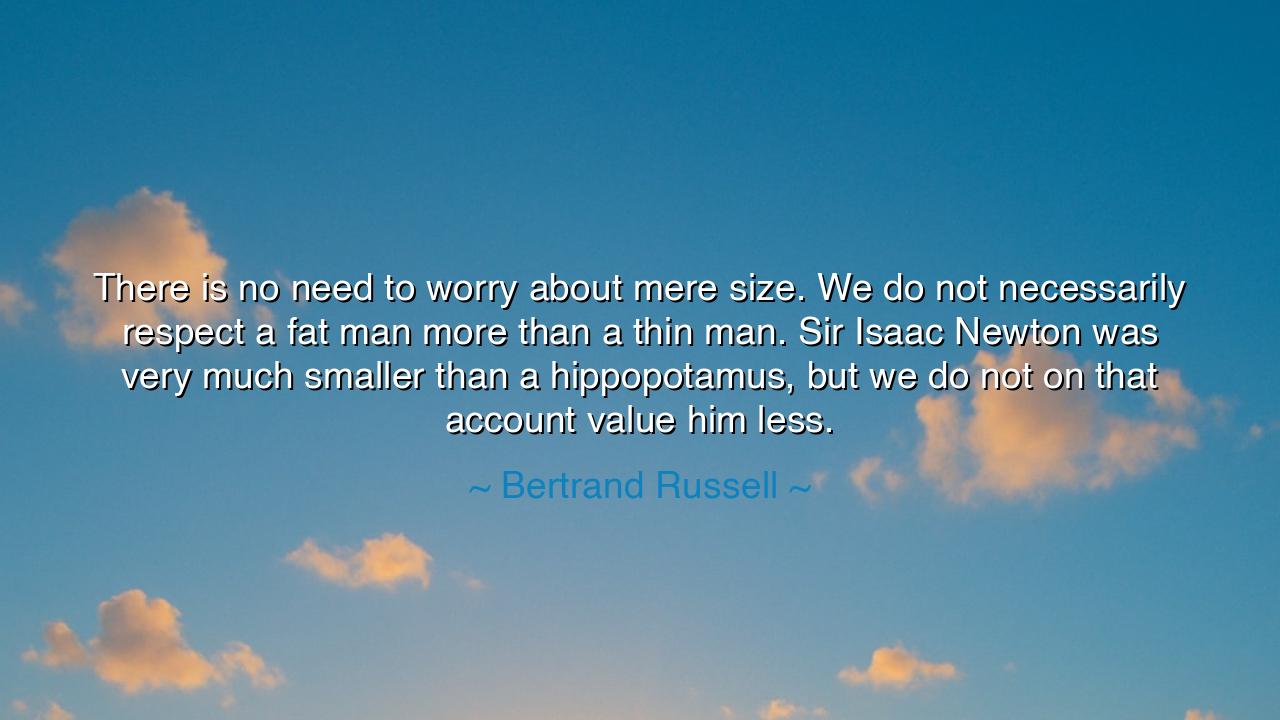
There is no need to worry about mere size. We do not necessarily
There is no need to worry about mere size. We do not necessarily respect a fat man more than a thin man. Sir Isaac Newton was very much smaller than a hippopotamus, but we do not on that account value him less.






Hear the wise jest of Bertrand Russell, cloaked in wit but heavy with truth: “There is no need to worry about mere size. We do not necessarily respect a fat man more than a thin man. Sir Isaac Newton was very much smaller than a hippopotamus, but we do not on that account value him less.” Behind these playful words lies a teaching as old as time itself—that greatness is not measured in bulk, nor worth in bodies, but in the radiance of the mind and the deeds of the soul.
The ancients knew this well, though they often dressed their wisdom in fable. Was it not David, the shepherd boy, who stood against Goliath, the giant warrior? The armies trembled before the giant’s stature, yet it was the boy’s courage and cunning that felled him. Here lies the truth of Russell’s words: the measure of a man is not in breadth of shoulders, but in the fire within his heart. To conflate size with worth is folly; to honor wisdom and spirit is the path of true discernment.
Russell draws upon the memory of Isaac Newton, small in stature, yet vast in intellect. A frail frame housed a universe of thought, one that unveiled the laws of gravity and motion. Could any beast, however mighty in size, rival the weight of Newton’s discoveries? A hippopotamus, immense and formidable, may rule the riverbanks, but it cannot measure the stars. Newton, though mortal and slight, shifted the course of human knowledge forever. Thus Russell reminds us: value is not in appearance, but in essence.
History offers us further proof. Consider Mahatma Gandhi, slight of build, draped in simple cloth, frailer than the might of an empire. Yet with his spirit of truth and nonviolence, he broke the chains of British rule in India. How many armies, how many fortresses, trembled before a man who weighed less than a soldier’s pack? His size was small, but his moral force was colossal. The world remembers not the girth of his body, but the immensity of his will.
Russell’s playful tone hides a warning: that societies often fall into the trap of revering appearances—wealth, stature, strength—while neglecting the quieter virtues of wisdom, integrity, and creativity. The great deception of life is to mistake the shadow for the substance, to admire the vast without asking if it is also good. The hippopotamus may outweigh Newton, but it does not outshine him. The powerful may tower above the meek, yet it is often the meek who shape the destiny of nations.
Therefore, child of tomorrow, let not your respect be swayed by outward size or power. Seek the inner worth, the brilliance of thought, the strength of character. Do not fear being small in the eyes of the world; the smallest flame can guide armies through darkness. Remember that in every age, those of slight stature have moved mountains through the magnitude of their ideas.
To live by this teaching, cultivate wisdom above appearance, knowledge above vanity, virtue above strength. Judge others not by what is seen, but by what is done. Honor the quiet thinker as much as the bold warrior. In yourself, do not despair if you seem small or overlooked; instead, nurture the greatness of spirit that cannot be weighed by scales. For the measure of your life will be written not in your height or girth, but in the depth of the legacy you leave behind.
Thus, in Russell’s jesting words, a solemn truth resounds: greatness lies not in size, but in substance. May you pass this truth to others, so that future generations will honor not the hippopotamus, but the Newtons, the Davids, the Gandhis of the world—those who prove that the smallest vessel may carry the most infinite light.






AAdministratorAdministrator
Welcome, honored guests. Please leave a comment, we will respond soon